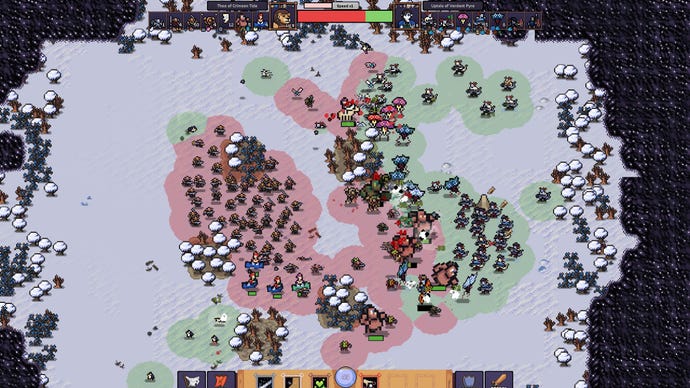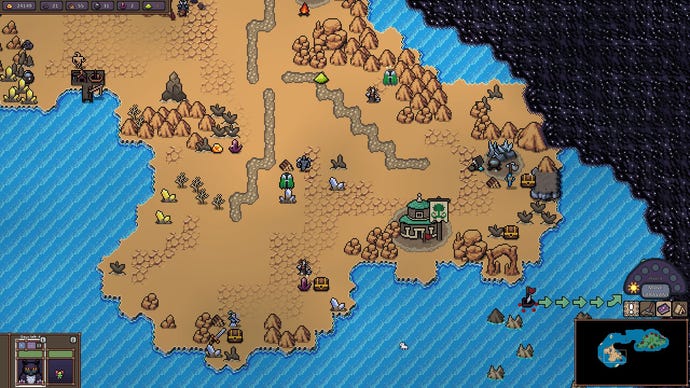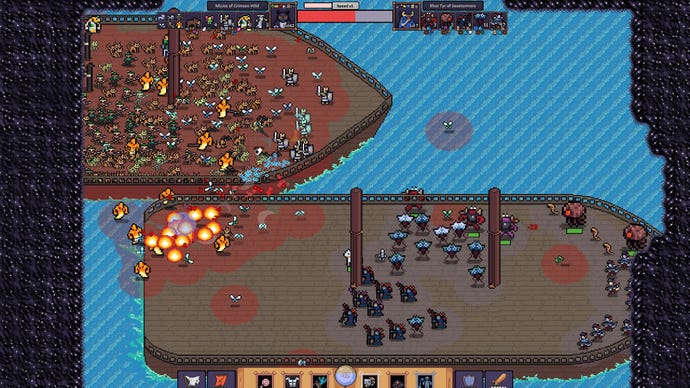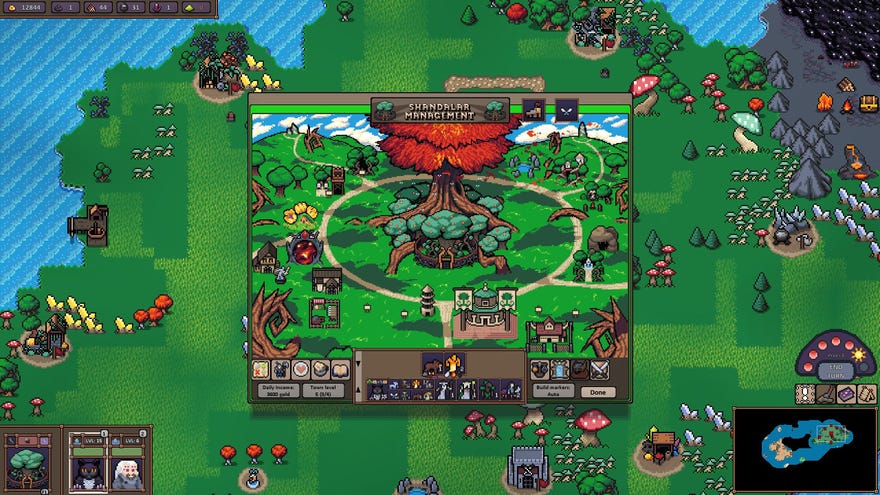Hero's Hour review: like eating a fistful of random jelly beans
Bless this mess
Picture the scene: you are at the beach. It is a real-time strategy beach, where metaphors happen. A lawless-looking child hands you a bucket. When you look into the bucket, you find sand, paint, bread, pottery, chocolate, nails, and several crabs all speaking different languages. Isn't this fascinating? What the hell is going on? This is Hero's Hour, an untidy RTS sand bucket filled with so many ideas it's hard to see how this turbulent mix will have any structural integrity at all when you finally up-end the bucket to build a tower. And yet… it sorta does? I don't know. I'm lost. How do I get off this beach?
You are a faction out to dominate in classical style, by defeating enemy armies and conquering their home city before they do the same to you as counter-conquest. You roam a world map as one or multiple Hero units, with an entourage of troops following behind as tiny sprites. There are mines, lumber mills and alchemy labs to capture, which will generate resources like ore, sulphur, gold, wood. All of which then auto-funnel to your hometown via little wagons. Using that earth-gotten capital, you upgrade your town, building a hero-recruiting tavern today, a magic-bequeathing tower tomorrow, and so on.
This town is key to it all, since it's the source of your soldiery. Think of this as a pixel-powered Mount & Blade minus the esoteric role-playing and princess wooing. Every day you're given a limited travel distance. Go pick up that treasure chest, go assault that army. When you're out of marching juice the day is over, so click "end turn". This is when the enemy CPU player will take their turn (or a real person if you can remember what those are - I don't). After a week of these turndays, your stocks of soldiers in town greatly replenish. And your army, probably a bit scraggly by now, can stop by for resupply, or wait as you ferry another Hero up with troops in tow.
Battles are automated bust-ups that only give you a small role. You can help set up the formation, putting a set of archers behind your melee gang, for example. And you can make vague clicky suggestions by dragging a unit around during a fight (usually not worth it). The idea is to have good numbers and well-trained troops going into the fight. The satisfaction coming not from having won due to skill or determination, but from preparation, strategy and forward-thinking. This is Crusader Kings style Sun-Tzu-ing, not Battle Brothers style tactical improvising.
A herd of wild boar will sometimes burp into existence behind your lines and that's just delightful
That said, you can cast spells during fights, like a line of burning salt through enemies or area-of-attack fire blasts, or buffing health boons. But the enemy CPU can do the same and every so often you see them pop a spell you've not used before. This is bad in the sense that sometimes a flash will occur and men will die or get bounced around and you won't understand why. Yet in another sense it is good, because a herd of wild boar will sometimes burp into existence behind your lines and that's just delightful. Painful, but delightful.
This is Hero's Hour's mushed-up medley at its best. There's a deceptively big library of units here. I played one game as the nature-obsessed Wild faction. They have a deer that charges into enemy troops and splurts out fairies when it dies, a final "bite me" to its killers. There's a unit called the Child of Midas, who kills enemies by turning them into gold, which you then collect as morbid loot-corpses after the battle, enriching yourself with each kill. There are elementals, like the fire elemental who can set enemies aflame with a chance of spreading throughout your foes ranks. Playing as these children of the forest has other advantages. Your side-goal is to allow grass and vines to overtake every captured mine or resource node, to let them become "overgrown", rewarding you with more elemental troops for each mine brought back to mother nature's weedy embrace. You still get resources from that mine, so it is more of a thematic twist than a risk-reward one. There are a lot of small flourishes of flavour like this. A lot of neat unit design packed into a small space.
Which makes it a pity the UI is so rough. There is tiny text in the unit explanations, everything looks basic, messages and stats are easily missed. The tech trees are painful to decipher. Presentation is sloppy in other places, with the pixels on one unit or building being noticeably bigger than the pixels on another. This is presumably to show some units are just physically bigger than others. But the clash makes everything look like proportions are skewy.

It's an untidy game. Battles often take on an explosive, deranged rhythm, impossible to read once you go past a certain number of combatants. It also doesn't easily allow deep micromanagement of troop numbers. If I want eight big ogres on the field and 90 stubborn goblin gunners and 11 hulking golems, there's no way to get those exact numbers. Instead you have to fiddle around with a drop and drag reserves menu and click on an auto-sort button any time you go over the limit, which just selects a broad variety of troops from across all units to sit on the bench, like some disinterested basketball coach. "Okay, you, you and you, I guess, take a seat." Really, coach, you want the gigantic Treant to sit this one out? Okay. If you're doing badly, you can call in those reserves with a big "SEND REINFORCEMENTS" button that appears. But it would be better if you had more control over which precise units to field in the first place.
As for the enemy's intelligence, well, that depends. Many standard baddies sit around, waiting for you to come and have a go if you fink yer 'ard enuff. These are only challenging if you charge in without heeding the "easy" or "moderate" or "nearly impossible" warning hovering over them. However, competing factions are beasts of their own, and seek to expand as you do. Their massive armies will show up on your doorstep while you're away. They will steal the boat you left unoccupied at the coast and use it to flank you. They aren't pushovers, and they can easily deliver the classic RTS blow of an irrecoverable, game-busting loss.

Lucky that restarts are quick. I wouldn't call it a rougelike RTS, but it has a dusting of randomisation to each game. The maps are always procedurally generated, for example, and spells learned by your hero are largely randomised. For example, your skill tree will tell you you'll learn "an air spell" but you won't know if that'll be the ability to disguise your troops (making enemy units lose interest in them) or the ability to wrap your precious army of lynx in protective bubbles. Will the earth spell you learn let you conjure creeping roots that slow your enemy, or (my personal favourite) summon a band of muddy goblins to infiltrate the adversary's flanks? In a genre that is often fixated on making sure every little thing is preordained so as to maximize clever planning, I found the relative chaos of the hero's skill trees pretty refreshing.
And there's a lot of helter-skelter stuff in there. You get spells that turn your units into giants, or the enemy into frogs. Spells that invoke the ghosts of fallen units to come fight for you. The auto-scrapping battles lack tactical bite beyond the opening decisions about formation. But the spells are arcane hand grenades that you can throw into battle whenever the auto-biffing is going awry. They're very cool.

And they're another example of the surprising magnitude and variety of imagination that's woven throughout a game which, on first impression, doesn't seem to be as complex as it is. There are 11 factions in this war. Think about that. The RTS genre is almost always about triads. In Hero's Hour there is a surplus of weirdoes. Zombie lads, fire idiots, gargoyle gang, dino jerks. There are 177 different unit types. There are over 80 spells, and you can learn a dozen of them in just a few in-game days. If this feels strange to play, it's partly because it does not adhere at all to the streamlined and sacred idea of rock-paper-scissors combat rules. It is about flavour and bedlam. Fights in Hero's Hour are less battles than they are riots.
I don't know what to make of it. It dubs itself an RTS but locks its map movement to turn-based limits. It has an impressive diversity of angry little fighting dudes, yet mostly automates the battles in which they fight. It has a lot of management to do and yet the UI is woeful, all the menus and pop-ups retaining a spartan prototype font. The result is a chaotic, messy, yet characterful take on map control, one that seems built to eliminate worries about whether you're performing enough actions-per-minute, while keeping other traditions of steamrolling your enemy into submission.
In other words, it's a big stodgy dinner plate piled with dissonant RTS ideas, the baked beans of unit management mixing with the Coco Pops of auto-battling. It's such a map-clearing jambalaya that it's difficult to tell which elements are working together and which are simply crowding out the fun parts. For all the things I can say about Hero Hour's design, it's not by-the-numbers. I can't even tell you if I enjoyed it or not, it's so much like eating a fistful of rando-flavoured jelly beans. And I suppose that in itself is kind of remarkable.


